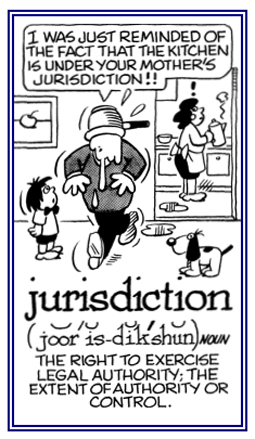jus-, just-, jur-
(Latin: right, upright, equitable; legal right, law)
Directly related to the jud-, judic- unit.
2. Etymology: from Latin jurisconsultus, "one who is skilled in the law, a lawyer" from juris, "right, law" + consultus, "skilled".
Jurisdiction is an exercise of judicial authority, or of the functions of a judge or legal tribunal, having the power of declaring and administering law or justice and who have legal authority or power.
2. Etymology: from Old French jurediction; from Latin jurisdictio(n); from jus, jur, "law" + dictio "saying"; from dicere, "to say".

Go to this Word A Day Revisited Index
so you can see more of Mickey Bach's cartoons.
2. A particular system or body of laws imposed by authorities.
3. Etymology: "knowledge of law" from Latin jurisprudentia, "the science of law"; from juris, "of right, of law" + prudentia, "knowledge, a foreseeing, foresight, sagacity, wisdom" as applied in this term.
Jurists are usually people who have distinguished themselves by writing about legal subjects or to judges.
Martin Roy was described by his colleagues as an eminent jurist in the area of legal processes.
In a surprise turn of events, the eminent civil law professional was selected as a juror for the upcoming conflict-of-interest trial.
Yesterday, Allen was selected to be a juror at the trial of the person who had committed fraud.
"The jury found Lee Jacob guilty of murder."
2. A group of individuals who have been selected to judge a competition: "The jury was divided as to which presentation was the most informative.""The international jury awarded the first prize in the beauty contest to a young African-American woman from Georgia."
2. Based on right; lawful: "She made a just claim for her injury."
3. In keeping with truth or fact; true; correct: "They made a just analysis."
4. Given or awarded rightly; deserved, as a sentence, punishment, or reward: "The court issued a just penalty."
5. In accordance with standards or requirements; proper or right.
6. Actual, real, or genuine.
Motto of Johann Georg, Elector of Brandenburg (1525-1598)
2. Lawfulness, as of a claim or title; justness of reason: "The justice of the decision that was given by the jury was unquestioned."
3. Conformity to a principle, as shown in behavior and treatment: "Her sense of justice in terms of victims of poverty was well known."
"The business man's outspoken leadership as Chief Executive Officer of the company confirmed his position that the administration of justice for all employees was a primary objective."
4. The administering of deserved punishment or reward: "The law was clear in terms of the justice that was meted out to killers."5. The maintenance or administration of what is deserved or appropriate by law: "The justice that is administered by this court is well respected in the area of gender equality."
6. Often a formal title of a legal officer or magistrate: "The justice of any court is expected to apply the law in a manner that is right and equitable."
7. To cause a person to come before a court for trial in order to receive punishment for illegal acts: "The thief was brought to justice and would be tried according to the legal statutes of his state."
8. To act or to treat fairly and without prejudice: "The courts are required to achieve justice for everyone." topic was so complex that the professor could not do justice to it in such a short time."


